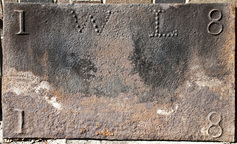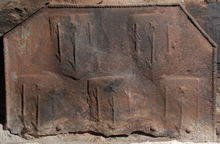-
1299
Description: Rectangular shape without edging; date in an elegant Roman style split between top and bottom corners; top centre, beaded initials WL.
Notes: The dotted initials are unusual, in all probabiltiy the dots being individually pressed into the moulding sand.
Inscription: I W L 8 / 1 8
- Decoration tags:
- rectangular (shape)
- none (edging)
- simple stamps
- carved stamps
- individual letters
- individual numbers
- text
Manufactured: in 1818 in England.
Current location: in private hands, Chiddingly, East Sussex, England.
- Attached to series:
- Date & initials firebacks
-
41
Description: Arched rectangular shape; rope edging (top and sides); Tudor royal shield, garter, crown and supporters (crowned lion and dragon); date above crown; empty motto compartment with initials below.
Notes: Identical arms can be seen on fireback formerly at Baynards Park, Cranleigh (no. 200), and on one in private hands at Maresfield (no. 482), neither of which have the motto compartment; minor variations in the position of individual elements indicate that the garter and shield, crown, and each supporter were separately stamped; the initials are likely to be those of Henry Bowyer, ironmaster (d.1588), the fireback perhaps being made in his memory.
Inscription: 1588 HB
Arms: Tudor royal (Elizabeth I)
- Decoration tags:
- rectangular with round arch (shape)
- rope (edging)
- carved stamps
- individual letters
- individual numbers
- armorial
- royal
- text
- objects
Manufactured: in 1588 possibly at Pounsley Furnace, Framfield in the Weald area of England.
Current location: in private hands, Cuckfield, West Sussex, England.
-
1126
Description: Canted rectangular shape; twisted rope edging (top and sides); cavetto-moulded-edged rectangle top centre, enclosing date between initials CT; five shields of Ayloffe impaling Sulyard in two rows (3-2); Ayloffe: sable, a lion rampant Or, collared gules, between three crosses formy of the second; Sulyard: argent, a chevron gules between three pheons inverted sable.
Notes: William Ayloffe (c1535-1584) of Bretons, Hornchurch, Essex, Justice of the Court of Queen’s Bench, married (c1560) Jane, dau. of Sir Eustace Sulyard, of Runwell, Essex. The initials 'CT' are likely to be those of Charles Tyler, a founder whose working life and that of his family have strong parallels with the occurrence of these firebacks. The smallest dated example in this series.
Inscription: C.1.6.0.9.T
Arms: Ayloffe impaling Sulyard (William Ayloffe of Bretons, Hornchurch)
- Decoration tags:
- rectangular with canted top corners (shape)
- rope (edging)
- carved stamps
- individual letters
- individual numbers
- heraldic
- armorial
- text
Manufactured: in 1609 possibly at Bedgebury Furnace, Goudhurst in the Weald area of England.
Current location: The Crown Inn, The Green, Horsted Keynes, West Sussex, England.
- Attached to series:
- Ayloffe series
- Personal armorial firebacks
-
558
Description: Arched rectangular shape; fillet edging; top centre, stamp formed of a carved domestic scene of a family around a table; in top corners, repeated small stamp of St George and the Dragon; below, repeated stamp of a pineapple in a pot; centre; small stamp of the royal arms of the United Kingdom 1801-37.
Notes: The domestic group has been formed from a decorative iron mantelpiece ornament portraying the tale of the goose that laid golden eggs. Having killed the goose, the family are lamenting the loss of their bounty (see Ames, 1980, p.94). The same mantelpiece group and pineapple stamp can be seen as decoration on the kitchen spit assemblage at Petworth House, West Sussex, which was cast at Robert Chorley's foundry at Cocking, south of Midhurst. Evidently this and another fireback bearing the same ornament stamp were among items from the Cowdray estate sold in 1898. Mitford collection, Petworth House.
Arms: Royal arms of the United Kingdom 1801-37
- Decoration tags:
- rectangular with round arch (shape)
- fillet (edging)
- carved stamps
- armorial
- royal
- animals
- humans
- plants
Manufactured: in the early-19th century probably at Cocking Foundry in the Weald area of England.
Current location: Petworth House, Petworth, West Sussex, England.
Museum number: NT/PET/M/50 (part of the National Trust museum group)
Citation: Ames, A., 1980, Collecting Cast Iron (Ashbourne, Moorland Publishing).
- Attached to series:
- Cocking foundry firebacks
- Ornament stamp firebacks
- Metalware stamp firebacks
-
693
Description: Canted rectangle; twisted rope edging (top and sides); a shield repeated five times, each bearing three arrows palewise, points down, with a molet (star) above the middle arrow, two over three.
Notes: Three arrows form the arms of several families, so identification of the arms is not possible without the associated colouring. The star is likely to be a mark of cadency, granted to a third son. Four rivets along the base may relate to earlier repair. The fireback was formerly at Chisenbury Priory, Wiltshire. A variant with three shields (W 740mm x H 480mm) was lot 530 at Brettells auction, Newport, Salop, 1 March 2022 and again as lot 457 on 2 May 2023.
Arms: Not known
- Decoration tags:
- rectangular with canted top corners (shape)
- rope (edging)
- carved stamps
- armorial
Manufactured: in the late-16th to early-17th century in England.
Current location: Cothay Manor, Stawley, Somerset, England.
- Attached to series:
- Personal armorial firebacks




